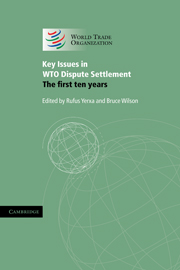Book contents
- Frontmatter
- Contents
- Notes on contributors
- Preface
- Table of cases
- Abbreviations
- PART I Introduction and General Considerations
- PART II The WTO Dispute Settlement System: Its Processes and Its Institutions
- PART III The WTO Dispute Settlement System: Systemic and Other Issues
- 12 The role of lawyers in the WTO dispute settlement system
- 13 Jurisdiction in WTO dispute settlement
- 14 Due process in WTO disputes
- 15 Standards of review in WTO panel proceedings
- 16 Administration of evidence in WTO dispute settlement proceedings
- 17 Confidentiality issues under the DSU: fact-finding process versus confidentiality
- 18 Panels' consultations with scientific experts
- 19 Amicus curiae participation in WTO dispute settlement: reflections on the past decade
- 20 Suspension of concessions and retaliation under the Agreement on Safeguards: the recent US – Steel Safeguards case
- 21 Compliance with WTO dispute settlement decisions: is there a crisis?
- 22 DSU review: a view from the inside
- PART IV Annexes
16 - Administration of evidence in WTO dispute settlement proceedings
from PART III - The WTO Dispute Settlement System: Systemic and Other Issues
Published online by Cambridge University Press: 04 August 2010
- Frontmatter
- Contents
- Notes on contributors
- Preface
- Table of cases
- Abbreviations
- PART I Introduction and General Considerations
- PART II The WTO Dispute Settlement System: Its Processes and Its Institutions
- PART III The WTO Dispute Settlement System: Systemic and Other Issues
- 12 The role of lawyers in the WTO dispute settlement system
- 13 Jurisdiction in WTO dispute settlement
- 14 Due process in WTO disputes
- 15 Standards of review in WTO panel proceedings
- 16 Administration of evidence in WTO dispute settlement proceedings
- 17 Confidentiality issues under the DSU: fact-finding process versus confidentiality
- 18 Panels' consultations with scientific experts
- 19 Amicus curiae participation in WTO dispute settlement: reflections on the past decade
- 20 Suspension of concessions and retaliation under the Agreement on Safeguards: the recent US – Steel Safeguards case
- 21 Compliance with WTO dispute settlement decisions: is there a crisis?
- 22 DSU review: a view from the inside
- PART IV Annexes
Summary
Introduction
I would like to discuss the use of evidence in a changing WTO dispute settlement landscape shaped by increasingly fact-intensive cases. The recent US – Upland Cotton and Korea – Commercial Vessels disputes brought under Articles 5 and 6 of the Agreement on Subsidies and Countervailing Measures (SCM Agreement) and the numerous sanitary and phytosanitary (SPS) cases are prominent examples of this trend, which is likely to increase. In such cases, WTO panelists demand and request from the parties (and even third parties) detailed factual information. I want to provide you with a sense of the means by which such facts are produced. I will start by describing how parties have a relatively free hand to produce multiple types of evidence because there are no WTO ‘rules of evidence’. I then discuss how panels have used their freedom to accept and consider – but not always use – multiple types of evidence in making factual findings. I will highlight new – at least for traditionalists of the General Agreement on Tariffs and Trade (GATT) – forms of establishing facts, such as affidavits, expert testimony, and live witnesses appearing before panels. I suggest ways that Members faced with such new types of evidence can raise objections and call into question their reliability. Finally, I will address the situation how, when one Member faces difficulty in securing information from a non-cooperating Member, adverse inferences or best information available could or have been used by panels.
- Type
- Chapter
- Information
- Key Issues in WTO Dispute SettlementThe First Ten Years, pp. 177 - 189Publisher: Cambridge University PressPrint publication year: 2005
- 1
- Cited by



